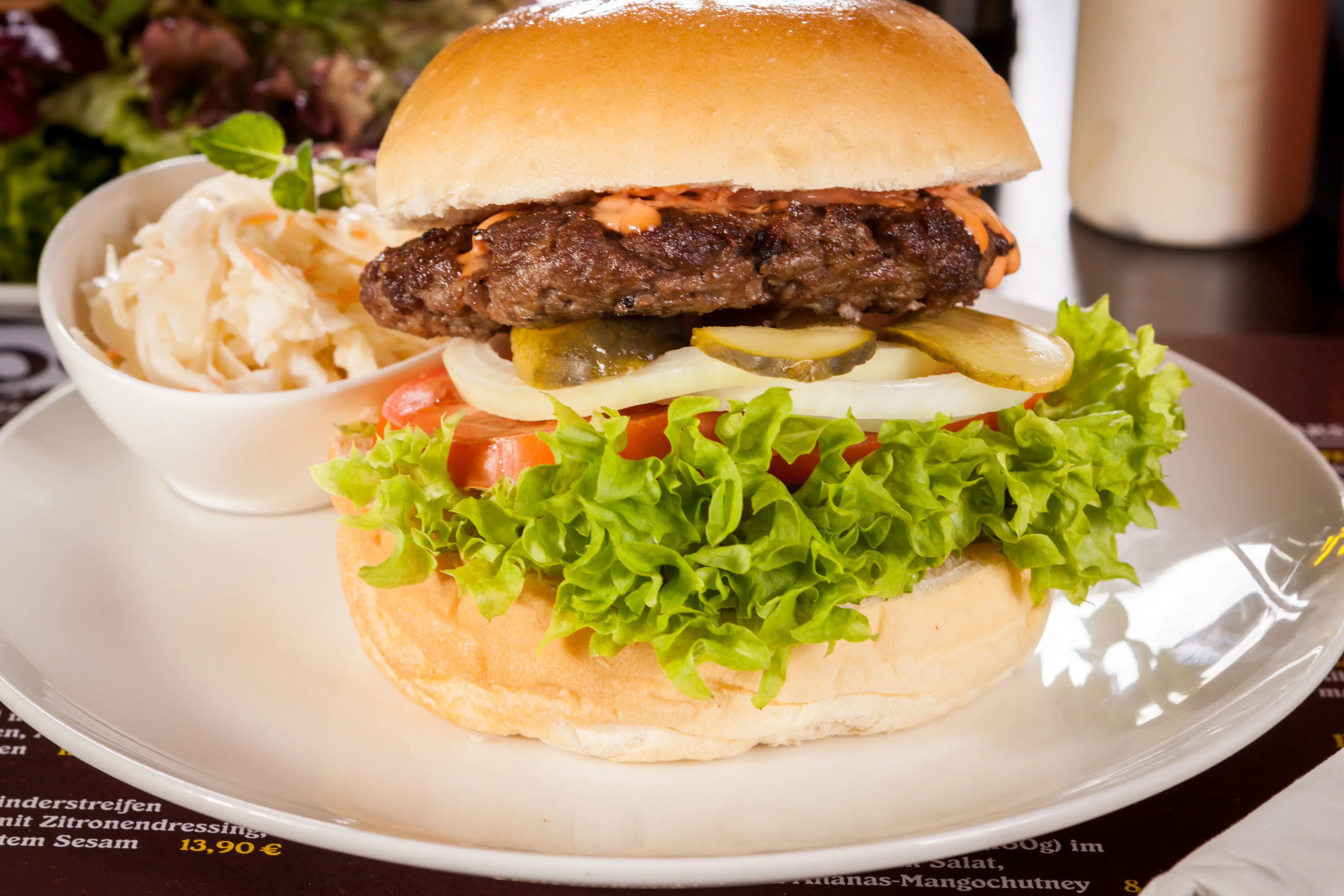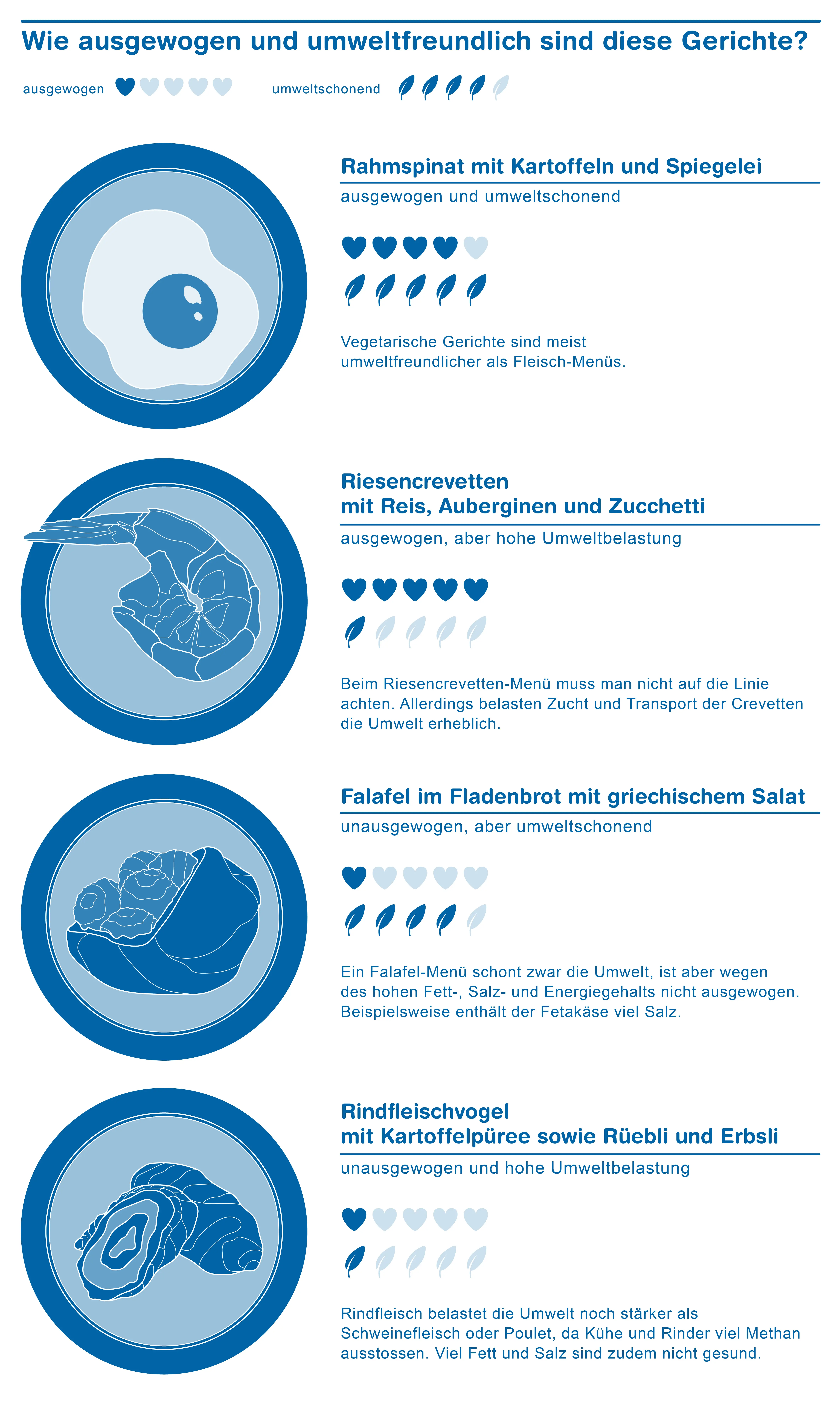Rating system for healthy and environmentally friendly meals
ZHAW researchers have developed an index that allows kitchen managers in catering businesses to put together sustainable menus easily. For the first time, guests are able to select their meals according to health and environmental aspects.

In Switzerland, about two-thirds of the people have lunch away from home, as the National Nutrition Survey has shown. Commercial catering in staff restaurants and canteens therefore plays an important role in combating diet-related diseases and negative environmental impacts, which are steadily on the rise. Although some caterers offer balanced or climate-friendly dishes, there is no comprehensive food rating and labelling system guests can use. Moreover, kitchen managers do not have the means to independently put together balanced and environmentally friendly meals in a way that is both simple and scientifically based. This is why an interdisciplinary ZHAW research team has developed a ‘Menu Sustainability Index’ (MSI) which takes into account both environmental and health-related criteria. In collaboration with the ZFV catering group, they implemented the instrument, trained cooks and tested guests’ reactions to the sustainability information. The project was supported by the Mercator Foundation Switzerland.
Making foods transparent
Given that information focussing only on the calorie or fat content of a meal is of little use to many consumers, the ZHAW model includes various nutrients, the energy content as well as the amount of fruit and vegetables contained in a meal and compares these with the latest recommendations. Healthy nutrients such as unsaturated fats are balanced against those, like fat and sugar, which are regarded as unhealthy when consumed in excess. The result is summarised in a score, given in ‘nutritional balance points’ (NBP), which indicates whether a meal is balanced or not. To assess the ecological sustainability of meals, the ZHAW researchers used the Ecological Scarcity Method, which is well-established in Switzerland. This method covers a wide range of ecological risks, such as resource scarcity and emissions, and weights them according to environmental policy goals. The resulting scores in ‘eco-points’ (EP) are available in detail for a large number of foods and have been adapted for use in the MSI. Overfishing was included as an indicator for the first time.
Making decisions based on personal preference
To allow guests to select their meals quickly and without needing much prior knowledge and to make them more aware of the issue of sustainable eating, the ZHAW researchers simplified the Menu Sustainability Index considerably and created graphics for everyday use: meals can be rated according to ecological and health criteria on scales of one to five. “Many foods do not achieve the same score for both sustainability aspects. Our graphics allow consumers to make their decision based on their personal preferences”, explains Claudia Müller, a nutritionist at the ZHAW School of Life Sciences and Facility Management. For example, a falafel dish may be environmentally friendly but, due to its high fat, salt and energy content, not particularly balanced.
Simple graphics are helpful
In a two-week test phase at three different ZFV staff restaurants offering the same main meals, the guests taking part in the survey reacted positively to the various graphics, finding them to be clear and helpful. In addition, there was an increase in guests’ awareness of balanced and environmentally friendly nutrition. “In order to ascertain changes in attitudes and long-term changes in behaviour, we would have to collect data over a longer period of time”, says Verena Berger from the ZHAW’s sustainability communication research group. A variety of possibilities are being considered. For example, guests could use an app to keep track of their own personal sustainability record throughout the course of a year, allowing the researchers to analyse the long-term effect of the MSI.
Transparent, science-based and easy to use
“The focus is not just on guests but also on kitchen managers, since the aim is that in future as many meals as possible achieve good scores from both the nutritional and the environmental point of view”, says Claudia Müller. Kitchen managers can just enter their meal plans into their resource planning system as usual, and the new ZHAW tool, which is connected to their system, automatically aligns and rates the entered ingredients according to the Menu Sustainability Index. “This allows kitchen managers to see at a glance what differences even small changes in ingredients can make – and it increases their self-competence at the same time”, says Müller. Project partner ZFV wants to introduce the instrument in 2018. In future, the aim is to make the Menu Sustainability Index and the accompanying tool available to all Swiss catering companies.
Contacts
Verena Berger, research associate in the sustainability communication research group, ZHAW Institute of Natural Resource Sciences, phone: 058 934 50 31, e-mail: verena.berger@zhaw.ch
Dr. Claudia Müller, lecturer in sustainability in the food value chain, ZHAW Institute of Food and Beverage Innovation, phone: 058 934 54 53, e-mail: claudia.mueller@zhaw.ch
Manuel Martin, ZHAW Corporate Communications, phone: 058 934 75 75, e-mail: medien@zhaw.ch
